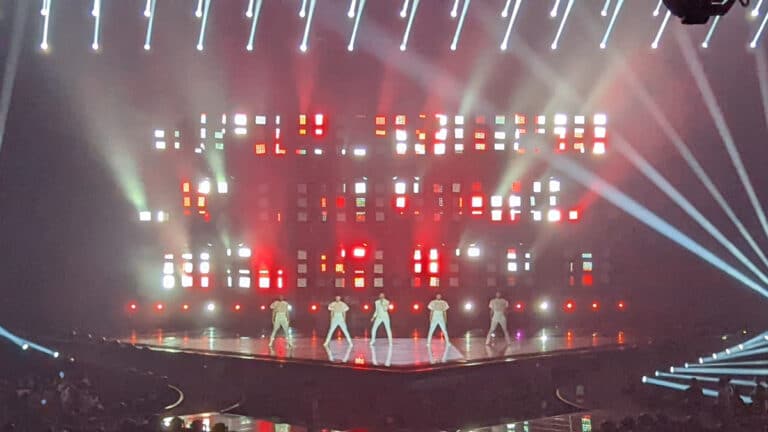
After the commemorative and celebratory yamim, and prior to Yom Yerushalayim, is another celebratory event in Israel this year, and perhaps a very legitimate expression of Zionism. That’s right – Eurovision. From May 14th to May 18th, the sleepless city of Tel Aviv will be in classic form.
Is Eurovision in Israel actually a distinct expression of Zionism? It depends. If Israel was created in order to normalize the Jewish people, then it is actually a great articulation of Zionism. In Like Dreamers, Yossi Klein Halevi describes how Chaim Herzog was “mortally threatened” by UN General Assembly Resolution 3379, which labeled Zionism as racism.
Klein Halevi writes, “Zionism had promised to cure anti-Semitism by demythologizing the Jews, transforming them into a nation like all the other nations… Give the Jews a state – a flag and postage stamps and marching bands – and they would become concretized, demystified. Normal. Zionism had been the Jews’ last desperate strategy for collective acceptance among the nations.”
On the other hand, in My Promised Land, Ari Shavit describes the nightlife in Tel Aviv and concludes, “What one sees is the revolt of twenty-first century youngsters against the demands and decrees and constraints imposed upon them by the Zionist project. No more, they say. Let us live. Let us seize the day.”
To truly understand Israel, to help your students deeply identify and connect with modern Israel, let’s ensure that their associations with Israel are about more than the Israeli-Palestinian conflict. As Gil Troy recently said, “Just as every conversation about the United States isn’t about race or poverty… not every conversation about Israel should be about the Palestinians.”
Let’s familiarize our young people with the Eurovision festivities in Israel, and perhaps engage them in the most critical question of all – Should Israel be “normal” like all other nations or does Israel’s being “normal” detract from the uniqueness of the Zionist vision from the beginning?
Eurovision 2019: Tel Aviv Edition
Most American kids don’t grow up on the Eurovision Song Contest. But in Europe and parts of the Middle East, it’s of World Cup proportions!
After winning the competition last year in Lisbon, with Netta Barzilai’s “Toy,” Israel will be hosting the contest in Tel Aviv over this coming week. Israel hosted the contest twice before, in Jerusalem in 1979 and 1999, after winning with songs: “Abanibi” in 1978 and “Diva” in 1998. (Israel also won in 1979 but declined hosting again in 1980 due to budget constraints.)
Barzilai and Israelis across the country were ecstatic at her win and with the opportunity to host the contest. However, hosting Eurovision in Israel is a bit trickier than in most other countries.
Here’s why:
ISRAEL: A COUNTRY LIKE ANY OTHER
Tel Aviv is a thriving international city, in competition with Paris, New York and London. It is the fifth most visited city in the Middle East and Africa. TimeOut calls it the “contemporary hub of Israel, the cultural capital, a culinary mecca and a beach bliss.”
One person Ari Shavit interviewed in My Promised Land explained, “Although life is demanding here, life here is so much fun…We are addicted to fun…We must party on and on.”
Was this Theodor Herzl’s vision? Maybe. He dreamt of a Jewish country like any other (and believed this would put an end to anti-Semitism). Tel Aviv is the Hebrew translation of Herzl’s utopian novel Altneuland (Old-New Land in English), a name first mentioned in Ezekiel that means “Mound of Spring” and symbolizes both the ancient base and the future growth the city’s founders anticipated.
Hosting Eurovision means bringing Tel Aviv’s fun, cultural, diverse and Jewish character to the world stage.
ISRAEL: HOME TO UNIQUE CHALLENGES
In his My Promised Land, Shavit writes that Tel Aviv represents the opportunity for Israelis to “just be.” Israelis have the “feeling that we don’t have to suffer and sacrifice anymore…. No one will conquer us. So we can breathe… And not only breathe, we even have to smile, laugh, go wild.”
But last week, Eurovision contestants arrived in Israel amidst intense rocket fire from Gaza. Islamic Jihad has even vowed to “prevent the festival.” This is not the average lead-up to Eurovision when it takes place on European soil…
The contest also ran into an internal Israeli conflict with its mandatory Sabbath practices. In February, this manifested in Shalva Band’s dropping out of the preliminary competition. In recent days, United Torah Judaism has halted coalition talks in response.
Originally Published Mar 13, 2019 05:39PM EDT


